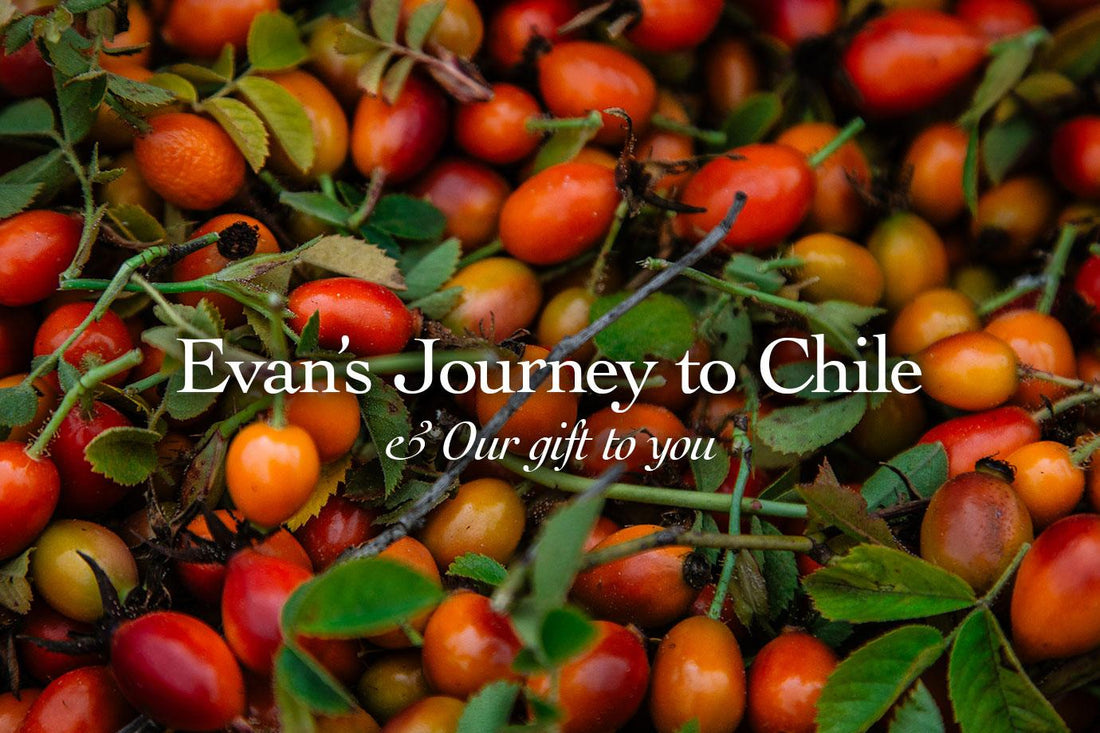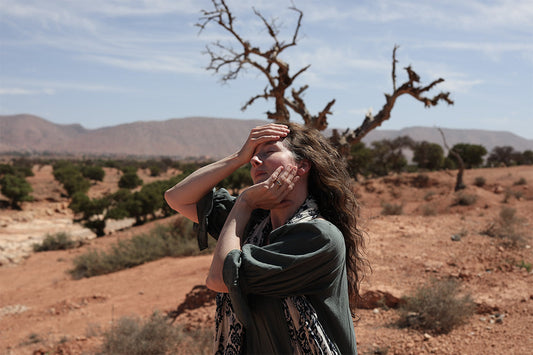Introducing our 100% pure, nutrient dense, wildharvested, certified organic and cold-pressed rosehip seed oil.

To see the rosehip harvest in live action, watch our video.
If we had to choose a single oil to do it all, for everyone, we would choose rosehip seed oil.
This miraculous oil has been Evan’s first choice for decades for its remarkable ability to rejuvenate, revitalize, nourish and beautify all skin. Rosehip seed oil is cold-pressed from the seeds held within the fruit of the rose plant. In autumn, after the petals have fallen, the plant begins to go dormant for the cold seasons, and it produces a deeply nutrient-rich fruit to house its seeds.

There are well over a hundred varieties of rose, yet it is the hip (fruit) of one particular variety — the wild, resilient, adaptable, Dog Rose (Rosa canina) — that has been tested, studied, and proven to have some of the highest amounts of nutrients within all plant oils. This is the variety that grows throughout Chile.
It has always been tremendously important to us to nurture our relationships with the growers, harvesters, farms, co-operatives, and tribal villages that cultivate and create the beloved plants we use in our mission to transform skin world wide. It is also important for us to visit, experience and thank the land that produces these miraculous ingredients. For these reasons, we journey around the globe to connect with these people and places who make what we do possible.
In March of 2018, Evan and her team journeyed to Chile to meet the collectors and producers of our certified organic, wild-harvested, cold-pressed rosehip seed oil.
This is the story of that journey, and of our rosehip seed oil.

We fly in on a red-eye. As we descend from our overnight journey to the southern hemisphere into the city of Santiago the sun begins to rise, softly, over the mystical mountains of the Andes, and the otherworldly light illuminates the cloud landscape that hugs the peaks and nestles into the valleys.
Even from our hotel you can see how we are cradled by these magnificent, ancient mountains that reign over this astonishing land.

When we arrive, it is a few days before the Equinox. And though our northern-hemisphere bodies expect spring, the equinox we’ll be experiencing here in Chile is the Autumnal Equinox — the perfect time of year to begin harvesting rosehips.
For a couple days we acclimate and settle into Santiago, we spend a little time learning about the indigenous people of Chile, the Mapuche, and about their myths and their art. For centuries rosehip — or Rosa Mosqueta — has been a deeply important plant to the Mapuche people. We stroll through some markets, and visit the Pre-Columbian Art Museum to continue deepening our understanding of this place, its people, and its history.

Then our days of exploring Santiago are up, and along with our companion from the oil pressing company, we board yet another plane for a quick flight to Concepción, the capital city of Region Bío-Bío in central Chile. Bío-Bío is a lush region known for its wineries, fishing industry, and abundant pine forests, and as we deplane we can certainly smell the fragrant aroma of fish on the ocean breeze so we know we’re in the right place.
At the airport, we’re picked up by Mauricio, the man who coordinates the rosehip collecting crew with the landowners, and we then drive to the city of Chillán which will act as our base during our time in the rosehip wilderness. The drive slightly evokes Northern California, in its mild, dry lushness, and given the natural resources that this region is known for, it makes sense that it might.


The morning after our flight to Concepción and dreamy drive to Chillán, we head from our hotel to the wilderness on the border of the regions Maule and Bío-Bío.
The land where our rosehip grows is extraordinary.
When we arrive, it is almost surreal in how lovely it is — the landscape, the weather, the colors. We are cradled by the green, tree-covered mountains. Their presence is not looming, towering or intimidating but vital, welcoming, and enveloping. Cathedral clouds speckle the vibrant, clear azure sky— so vastly different from the frequent smog of Santiago.

Striking, rich, and abundant with life, this is the wilderness where our rosehip grows. These are the rolling, vital lands that nurture and nourish — the place where these plants thrive, all without human intervention. Fed only by this fertile soil, watered only by those cathedral clouds, and touched only by the graceful wind that gently dances over these hills.
Spilling out of the cars, we meet the team, and then stalk through the hills, awed by the beauty as we explore the land that fosters our cherished oil.
Harvesting rosehip is an incredibly labor-intensive process that requires significant layering of protective gear. The collectors wear thick, heavy protective arm, shoulder and leg protectors, along with gloves and heavy-duty work boots, to protect themselves from the treacherous thorns of the Rosa canina — or Dog Rose, named as such because of the small but vicious thorns that will snag you like dog teeth if you’re not careful.
Once geared-up, the collecters use small hand-rakes to remove the ripe hips from the tenacious, scraggly rose plants, and drop their harvest into a sack that hangs near their waists. Surprisingly no damage is caused by the raking, and the hearty hips stay firm and plump and continue to ripen and become even more vibrant after harvest.




Once their load is heavy enough, they empty it into large sacks that can weigh between twenty-five and forty kilos. These filled sacks are later delivered to the drying facility.

We spend hours watching them harvest, masterfully working from rose bush to rose bush, until much later afternoon when it’s time for ‘lunch’.

We are driven by the team supervisor, Victor, at a delightfully break-neck, and giggle-inducing speed down the dusty, dirt road to an enchanting hill under an old oak tree where the collectors have set up their day camp.
They make us a traditional asada of grilled meat, salad, rice, fresh berry juice, yerba mate tea, and cake, and together we feast, talk and enjoy each other’s company until the sun begins to dip low in the sky and it’s time to make the winding two-hour drive back to Chillán.


Most rosehip seed oil producers in Chile have no connection to the land, harvest or processing of their raw materials. They simply purchase the already-processed seed from one of the few, large corporations that dominate the Chilean rosehip industry.
This is not true for our rosehip oil — our rosehip oil producer is involved in every step of the process. They visit the fields, have direct relationships with the collectors, dry and process the seeds themselves, and then finally, cold-press the oil from the seeds.
Only 3% of the rosehip seed is oil. That means 100 kilos of rosehip seed = only 3 kilos of oil. With such a small percentage of oil in each seed and harvesting and processing being so labor intensive, it’s no wonder that there’s been increased adulteration as rosehip has grown in popularity. Additionally, much of the rosehip exported worldwide is extracted through hexane — a toxic, industrial solvent. Without working directly with the ingredient producer, it’s almost impossible to verify that you’re getting authentic, fresh, truly organic and cold-pressed rosehip seed oil.
We pay sixty percent more for our direct-sourced rosehip than we would if we chose to purchase from distribution warehouses. This premium is worth it a thousand times over. The difference between the oil from a distribution warehouse and the fresh oil direct from the pressing facility is night and day. It is a difference that can be seen and felt. Truly fresh, unadulterated, cold-pressed rosehip seed oil smells slightly sweet, nutty, and almost tea-like. This silky oil of the rosehip seed absorbs instantly into the skin. Meanwhile, the rosehip oil we’ve sampled from distribution warehouses frequently smells fishy (a sign of rancidity), and is often tacky upon application.
By paying this premium, we ensure that not only are our collectors paired a fair wage, but also that we have the freshest oil possible, and complete transparency and traceability through every aspect of production.

The rosehip plants grow wild on land owned by farmers and ranchers. That’s where Mauricio comes in. He works with over twenty-five farms and ranches, spanning hundreds of thousands of hectares, in the regions of Bío-Bío and Maule to coordinate the rosehip harvest. He communicates between the landowners, the collectors, and the oil producers. He is the thread that ties everything together.

From the fields of the Bío-Bío and Maule wilderness, the harvested rosehips are driven to Chillán to the drying facility.
Once they arrive, the processing begins. Before they are dried, the rosehips are thoroughly washed in cool water. After their washing, they are dried for fourteen hours in a drying “tunnel” that is heated by wood fire. When the drying is complete, the seeds are separated from the shells. The shells of the rosehip are stored for use in food, supplements, and cosmetics, while the seed of the rosehip is stored for oil production.
The best way to store rosehip seed oil is by keeping it within the seed itself as long as possible. Whole rosehip seeds can keep for over a year before they begin to lose their potency. As a high omega-6 oil (a wonderful thing for the skin), rosehip oil is unfortunately prone to quick oxidation, so it’s ideal to only press the seed when you are ready to use the oil.
From the drying facility in Chillán the rosehip seeds are sent to the pressing facility in Santiago where they are stored until they are ready for cold-pressing.
Our producer cold-presses us fresh oil each time we place an order. The oil never sits around in a storage warehouse. We call in the order and they begin the process of production by grinding the seeds into meal. The freshly ground meal is then cold-pressed to extract the oil.
Through the unique design of their pressing facility, the oil never once comes in contact with air once it’s been expressed from the seed. Which means from the time the rosehip seed oil is pressed, it does not come in contact with air until we open the shipping containers in our facility in San Diego, in preparation for blending it into our products. Once blended into formulation, our products stay on the shelf for only a matter of a few weeks before being shipped to customers.
This is the freshest rosehip seed oil possible. Harvested from the mineral-rich, untainted wild soils of the southern Andes, completely certified organic, cold-pressed to order, and never sitting on a warehouse shelf.

Rosehip seed oil is a remarkably light-weight oil that penetrates skin rapidly, and in the world of aromatherapy is actually considered a ‘dry’ oil because of the completeness with which it absorbs. Its unique profile of vitamins, antioxidants, and essential fatty acids make it a profoundly nourishing feast for the skin.
And for centuries it has been used to care for skin that is damaged, scarred, burned, flakey and irritated. While rosehip is a special oil for truly every skin type, it’s especially revered for its ability to beautify skin that is scarred or hyper-pigmented. It restores, rejuvenates, and illuminates like no other singular oil.
Here are a few of the dominant compounds that make up the amazing matrix of rosehip seed oil:
Omega 6 (Linoleic Acid)
An essential fatty acid that is truly essential to support proper barrier function, along with moisture and sebum regulation within the skin. Often deficient in acne-prone skin.
Omega 3 (Linolenic Acid)
Heat pacifying essential fatty acid, restorative, nourishing, protective.
Phytosterols
Plant sterols that support the protective lipid barrier. These compounds have been shown to encourage collagen synthesis and protect existing collagen.
Trans-Retinoic Acid
Also known as Pro-Vitamin A. A powerful, rejuvenating compound known to support both aging and acne-prone skin. Smoothes, beautifies, minimizes the appearance of hyper-pigmentation, fine lines, and scarring.
Lycopene
An antioxidant carotenoid. Pacifies heat, harmonizes skin with the sun
Also, while it isn’t the dominant fatty acid, rosehip oil also contains omega-9 (oleic acid), rounding out the EFA profile to be a lovely source of omega 3-6-9.
As a note. While the shell contains notable amounts of Vitamin C, it is not present in the oil, as Vitamin C is a water-soluble compound. This is true for all rosehip seed oil.
Essentially, rosehip is an incredible ally for skin that has damage that needs to be undone.
Our two Rosehip Serums are almost entirely rosehip seed oil. The rosehip oil within them is supported by a very small amount of jojoba oil — which we’ve primarily used in this formula as a preservative — and non-GMO tocopherol. The serums are then amplified by the powerful, therapeutic organic essential oils that Evan has masterfully blended to address the two dominant skin imbalances — proper moisture levels (Rosehip Rose Balancing Serum), and skin with excess-heat (Rosehip Blue Calming Serum).
- As always, make sure to pair our oil serums with your favorite HydroSoul for the greatest benefit.
Rosehip (Rose) Balancing Serum
- For all skin — especially dry, oily, and/or combination
- Featuring therapeutic essential oils of rose geranium, sandalwood, carrot seed, and rose otto
Rosehip (Blue) Calming Serum
- For all skin — especially sensitive, reactive, blemish-prone
- Featuring therapeutic essential oils of blue chamomile, lavender, immortelle, and carrot seed
Rosehip seed oil also plays a significant role in:
Pomegranate Vitality Serum
- For all skin — especially mature, troubled, teen, sensitive, dry
- A deeply nourishing and protective complex of oils: pomegranate seed, rosehip seed, sea buckthorn berry, and jojoba oil.
- Free of essential oils
Wild Carrot Immortelle Eye Balm
- For all skin
- Daily application tones, nourishes, brightens, smoothes, and protects the delicate skin of the eye area
- With certified organic oils of sunflower, avocado, cocoa butter, rosehip, and coconut
Blemish Purifying Serum
- Botanical spot treatment
- An effective choice for teen or impure skin. Helps purify blemishes without irritating sensitive skin.
- Featuring rosehip seed oil, thyme thymol, and bay laurel









